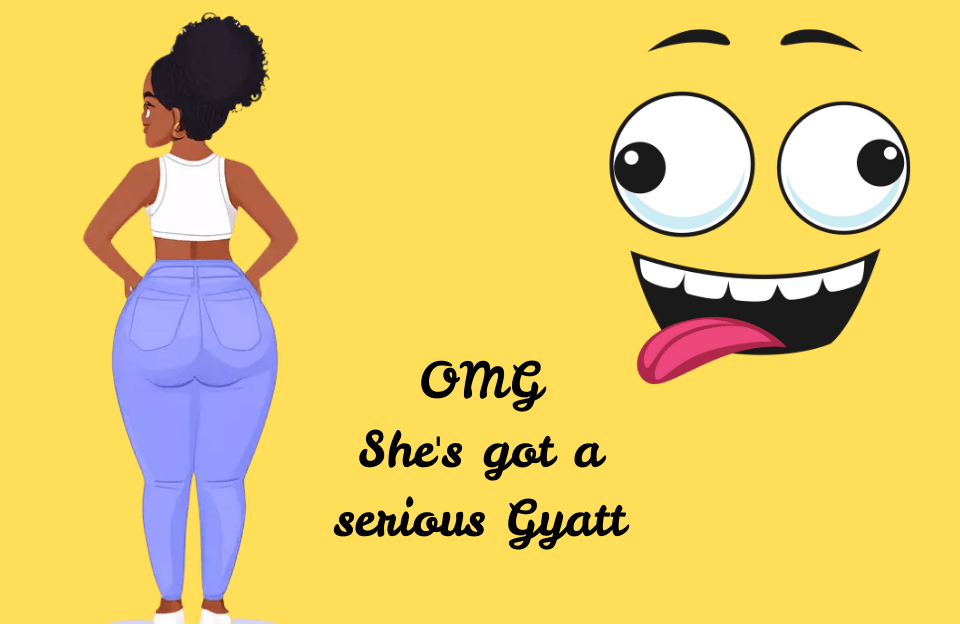If you’ve spent any time on TikTok, you’ve probably come across the term “gyatt”. It might have left you scratching your head, wondering, “What does gyatt mean?” Don’t worry—you’re not alone. In this article, we’ll break down the meaning of “gyatt,” its origins, how it’s used, and why it matters.
Key Takeaways
- Gyatt is an internet slang term used to express surprise or admiration, especially in reaction to someone’s body, particularly a large buttocks.
- It originated from African American Vernacular English (AAVE) as a phonetic variation of “goddamn.”
- The term gained popularity on platforms like TikTok and Twitch, especially among Generation Alpha.
- While often used humorously, it’s important to be mindful of its context to avoid objectification.
What Does Gyatt Mean?
At its core, “gyatt” is an exclamation used to express surprise, admiration, or excitement. It’s often used in reaction to seeing someone with a curvy body, particularly a large buttocks. Think of it as a modern-day equivalent of saying “wow” or “damn” but with a bit more flair.
Gyatt as an Exclamation
When someone sees something impressive or surprising, they might shout “gyatt!” It’s similar to how people might say “oh my god” or “wow” in English. For example:
“Did you see that dance move? Gyatt!”
Gyatt as a Noun
In some contexts, “gyatt” is used as a noun to describe someone with a curvy body. For instance:
“She’s got a serious gyatt.”
The Origins of Gyatt
The term “gyatt” has roots in African American Vernacular English (AAVE). It’s a phonetic variation of “goddamn,” often used to express surprise or emphasis. Over time, the usage of “gyatt” evolved, and it began to be associated with admiration for curvy bodies, particularly large buttocks.
The term gained significant popularity in the early 2020s, largely due to its frequent use by online personalities on platforms like TikTok and Twitch. Streamers like YourRAGE and Kai Cenat helped bring “gyatt” into the mainstream, using it during their broadcasts to react to attractive individuals.
How Is Gyatt Used on TikTok?
On TikTok, “gyatt” is often used in the following ways:
- As a Comment: Users might leave comments like “Gyatt!” or “Level 100 gyatt” on videos featuring individuals with curvy bodies.
- In Hashtags: Creators use hashtags like #gyatt or #gyattcheck to tag content related to curvy individuals.
- In Memes: The term is frequently featured in memes and viral videos, often accompanied by exaggerated reactions or animations.
Why Is Gyatt Controversial?
While “gyatt” is widely used and understood in online communities, it’s not without controversy. Some argue that its frequent use objectifies individuals, particularly women, by reducing them to their physical attributes. This can contribute to a culture of body shaming and reinforce unrealistic beauty standards.
It’s important to remember that behind every video and comment is a real person. Using terms like “gyatt” should be done with respect and consideration for others’ feelings.
Gyatt vs. Other Slang Terms
| Term | Meaning | Usage Context |
| Gyatt | Exclamation of surprise or admiration | Reaction to curvy bodies |
| Rizz | Short for charisma; flirting ability | Describing someone’s charm |
| Cap/No Cap | Lying/Not lying | Expressing truthfulness |
| Drip | Stylish or fashionable | Describing someone’s outfit |
FAQs
Q: Is “gyatt” a new term?
A: No, “gyatt” has been used in African American Vernacular English for years. Its current usage gained popularity in the 2020s through online platforms.
Q: Is it okay to use “gyatt”?
A: While it’s commonly used online, it’s important to be mindful of the context. Using “gyatt” in a respectful manner is key to avoiding objectification.
Q: Does “gyatt” have any other meanings?
A: In some cases, “gyatt” is used as a backronym, standing for phrases like “Girl, You Ate That.” However, these interpretations are more playful and not the primary usage.
Final Thoughts
“Gyatt” is a term that has evolved over time, reflecting changes in internet culture and language. While it’s widely used and understood, it’s crucial to approach its usage with respect and awareness. After all, language shapes our interactions and perceptions, both online and offline.
So, the next time you come across a video that leaves you in awe, you might just find yourself saying, “Gyatt!”

